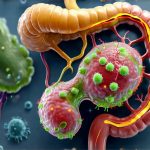The immune system is arguably the most complex network within the human body, constantly working to defend against a barrage of pathogens. For decades, vaccine development focused primarily on directly stimulating this system, aiming to create robust antibody responses and long-term immunity. However, recent research has begun to reveal a critical, often overlooked player in this equation: the gut microbiome. This vast community of microorganisms residing within our digestive tract isn’t merely involved in digestion; it’s deeply interwoven with immune function, influencing how we respond to vaccines and impacting overall immune resilience. Understanding this intricate connection is transforming our approach to preventative medicine and offering new avenues for optimizing vaccine efficacy.
The realization that the gut microbiome plays such a pivotal role stems from several converging lines of evidence. Studies have shown significant variability in vaccine responses between individuals, even when controlling for age, genetics, and other factors. This led researchers to investigate the potential influence of the microbial communities living within us. It’s now understood that the composition and diversity of the gut microbiome can profoundly affect both innate and adaptive immunity, ultimately shaping our ability to mount an effective response to vaccination. Moreover, a healthy gut isn’t just about reacting to threats; it actively prepares and educates the immune system, building resilience against future challenges. This is why maintaining a balanced gut microbiome is increasingly recognized as essential for optimal health and wellbeing. Understanding the effects of antibiotics can help maintain this balance.
The Gut-Immune Axis: A Two-Way Street
The relationship between the gut microbiome and the immune system isn’t one-sided; it’s a dynamic, bidirectional exchange known as the gut-immune axis. This means that the microbes in our gut influence the development and function of the immune system, and conversely, the immune system influences the composition and activity of the microbial community. This constant communication is vital for maintaining homeostasis – a state of balance within the body. A significant portion (estimated 70-80%) of the immune system resides in the gut-associated lymphoid tissue (GALT), making the gut the largest immunological organ in the body.
The microbiome influences immune development from infancy, helping to “train” the immune system to distinguish between harmless and harmful antigens. This early exposure is crucial for preventing autoimmune diseases and allergies. Specific microbial metabolites, such as short-chain fatty acids (SCFAs) produced during fiber fermentation, play a key role in modulating immune cell function. SCFAs like butyrate have been shown to enhance gut barrier integrity, reduce inflammation, and promote the development of regulatory T cells, which are essential for suppressing excessive immune responses. Dysbiosis, or an imbalance in the gut microbiome, can disrupt this delicate balance, leading to chronic inflammation and impaired immune function. Understanding gut inflammation is key to addressing dysbiosis.
Furthermore, the gut microbiome influences systemic immunity – that is, the immune response throughout the body. Microbial components can travel beyond the gut, interacting with immune cells in distant tissues and organs. This means a healthy gut can bolster immune defenses not just locally, but systemically, enhancing our ability to fight off infections and respond effectively to vaccines. The composition of the microbiome even impacts the efficacy of certain vaccine types, as demonstrated in studies showing altered antibody responses following vaccination in individuals with different microbial profiles.
Factors Influencing Gut Microbiome Composition
Many factors can influence the composition of an individual’s gut microbiome, making it highly personalized and susceptible to change. These include:
- Diet: This is arguably the most significant factor. A diet rich in fiber, fruits, and vegetables promotes a diverse and beneficial microbial community, while a diet high in processed foods, sugar, and saturated fats can lead to dysbiosis.
- Antibiotics: While essential for treating bacterial infections, antibiotics indiscriminately kill both harmful and beneficial bacteria, disrupting the gut microbiome’s delicate balance. Repeated antibiotic use can have long-lasting effects on microbial diversity.
- Stress: Chronic stress can negatively impact gut health by altering gut motility, reducing blood flow to the digestive system, and affecting the composition of the microbiome.
- Geography & Environment: Exposure to different environments and geographical locations introduces variations in microbial exposure, influencing the development of the microbiome.
- Genetics: While not as dominant a factor as diet or antibiotics, genetics can play a role in determining an individual’s predisposition to certain microbial communities.
Restoring gut health often involves addressing these factors. Strategies include adopting a fiber-rich diet, minimizing antibiotic use (when appropriate), managing stress levels through techniques like mindfulness and yoga, and potentially incorporating probiotics – live microorganisms intended to benefit the host – or prebiotics – non-digestible fibers that feed beneficial bacteria. However, it’s important to note that probiotics aren’t a one-size-fits-all solution, and their effectiveness can vary depending on the individual and the specific strain used. Addressing irregular eating habits can also play a role in restoration.
Vaccine Response & Microbial Diversity
The link between gut microbial diversity and vaccine response is becoming increasingly clear. Studies have demonstrated that individuals with higher gut microbial diversity tend to exhibit stronger antibody responses following vaccination. This is thought to be due to several mechanisms. Firstly, a diverse microbiome produces a wider range of microbial metabolites like SCFAs, which modulate immune cell function and enhance antibody production. Secondly, a balanced microbiome promotes the development of a more robust and adaptable immune system capable of mounting an effective response to novel antigens presented during vaccination.
Specifically, research suggests that certain bacterial species are associated with improved vaccine responses. For instance, Akkermansia muciniphila, a bacterium known for its ability to strengthen gut barrier function, has been linked to enhanced antibody production following influenza vaccination. Similarly, the presence of Faecalibacterium prausnitzii, another key SCFA producer, has been associated with improved immune responses to various vaccines. Conversely, individuals with low microbial diversity or an overabundance of potentially harmful bacteria may exhibit weaker vaccine responses and reduced protection.
It’s important to emphasize that manipulating the gut microbiome isn’t about achieving a specific “ideal” composition; it’s about fostering diversity and balance. A diverse microbiome is more resilient and adaptable, better equipped to respond to challenges, including vaccination. Strategies aimed at increasing microbial diversity – such as dietary changes, prebiotic supplementation, and minimizing unnecessary antibiotic use – can potentially optimize vaccine efficacy and enhance immune resilience. The impact of diet diversity on gut health cannot be overstated.
The Future of Vaccine Adjuvants & Gut Modulation
The growing understanding of the gut-immune axis is opening up exciting new possibilities for improving vaccine design and administration. Traditionally, adjuvants – substances added to vaccines to boost the immune response – have focused on directly stimulating the innate immune system. However, there’s increasing interest in exploring the potential of using microbial metabolites or even whole microbes as novel adjuvants. SCFAs, for example, could be incorporated into vaccine formulations to enhance antibody production and promote long-lasting immunity.
Beyond adjuvant development, gut modulation strategies are being investigated as a way to improve vaccine efficacy. Prebiotic supplementation before or during vaccination has shown promise in enhancing immune responses in several studies. Similarly, fecal microbiota transplantation (FMT) – the transfer of fecal matter from a healthy donor to a recipient – is being explored as a potential intervention for restoring gut health and improving vaccine responsiveness in individuals with compromised immune systems.
However, it’s crucial to approach these strategies with caution. The gut microbiome is incredibly complex, and interventions aimed at manipulating it can have unintended consequences. More research is needed to fully understand the optimal strategies for gut modulation and ensure their safety and effectiveness. Understanding environmental toxins and their impact on liver health is also important in this context. Ultimately, a holistic approach that integrates dietary changes, lifestyle modifications, and potentially targeted microbial therapies holds the greatest promise for harnessing the power of the gut microbiome to enhance vaccine response and build lasting immune resilience. This signifies a shift in perspective – moving beyond solely focusing on the pathogen or the vaccine itself, to recognizing the vital role of our internal ecosystem in shaping our immunity. The impact of cold beverages can also affect this balance. Finally, consider the effects of antibiotics—effects of antibiotics are significant and should be carefully considered when modulating the gut microbiome.


















